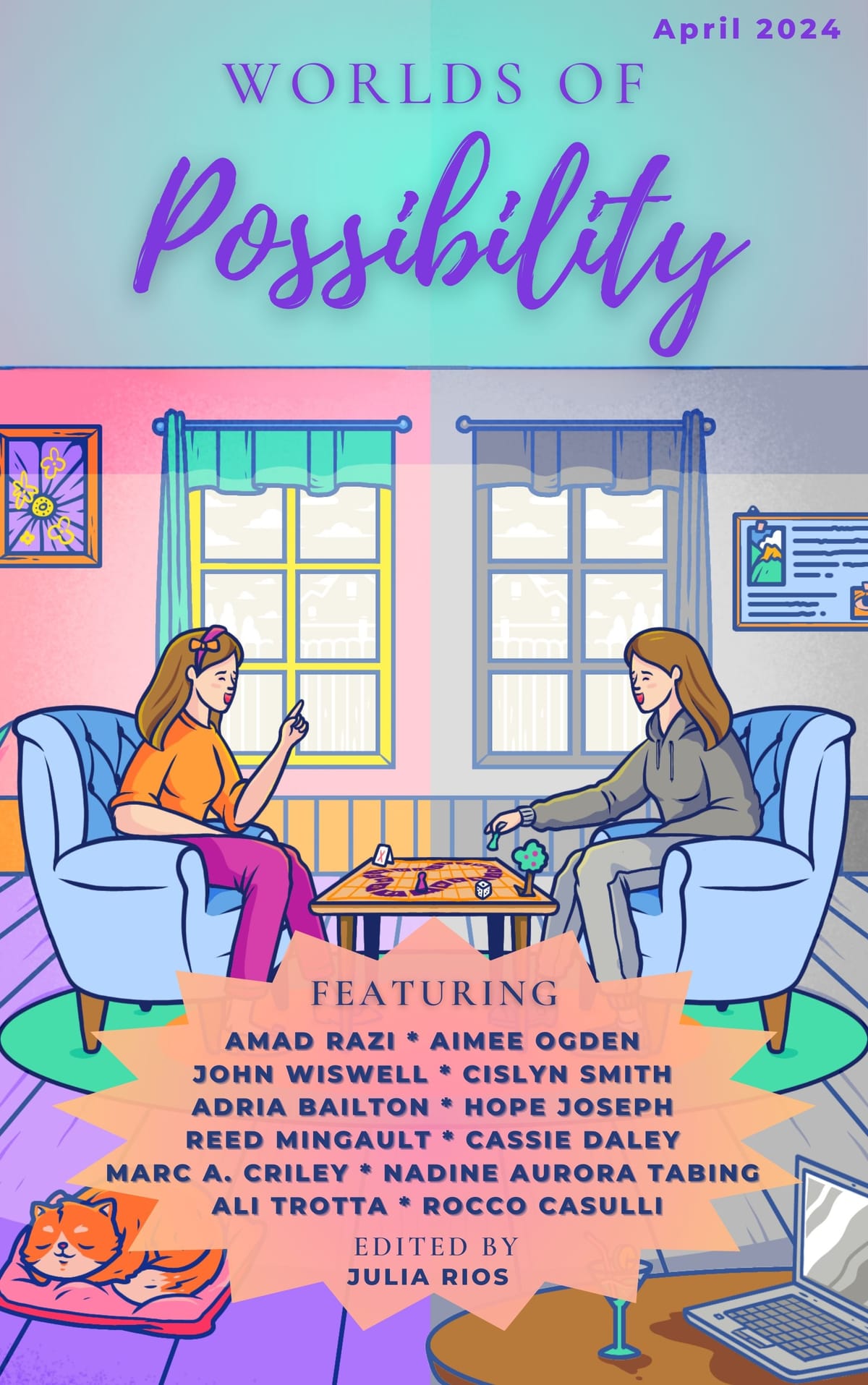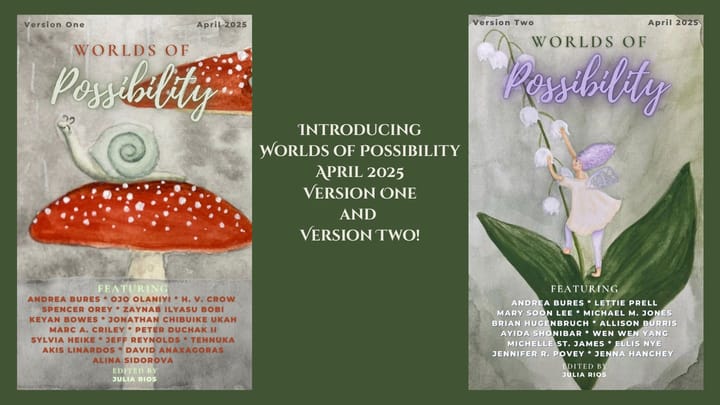Introducing the April 2024 Issue of Worlds of Possibility
This issue contains six stories, two poems, three original illustrations, one featured artist spotlight, and one 100 word drabble.

The February 2024 issue of Worlds of Possibility has gone out to paid subscribers, who can get their copy here: https://www.juliarios.com/the-april-2024-issue-of-worlds-of-possibility
If you would like to buy an individual copy of this issue instead of subscribing, you can do that here: https://www.patreon.com/juliarios/shop/worlds-of-possibility-april-2024-195114
This issue contains six stories, two poems, three original illustrations, one featured artist spotlight, and one 100 word drabble. Wherever you see art that is not credited, it is because I personally did graphic design using stock art. To the best of my knowledge, I do not use AI.
Table of Contents:
- Featured Artist: Amad Razi
- “No S’mores For Me, Thank You” by Marc A. Criley (100 word drabble)
- “Inheritance in Six Parts” by Nadine Aurora Tabing (short story: 842 words)
- “Silver Tracings in Starlit Skies” by Reed Mingault (short story: 936 words, with an illustration by Cassie Daley)
- “Gospel for the Old” by Hope Joseph (13 line poem)
- “The Last Adult Superstore” by John Wiswell (short story: 1,100 words)
- “W.F.A. #31” by Adria Bailton (short story: 168 words)
- “A Simulacrum of Self by Aimee Ogden (short story: 781 words, with an illustration by Amad Razi)
- “Charming” by Cislyn Smith (46 line poem)
- “The Door Opens” by Ali Trotta (short story: 3,540 words, with an illustration by Rocco Casulli)
We continue to witness genocide in Palestine, and at the time of my writing, across the US, we are seeing clashes between students and university administrations, often with cancelled commencement activities and violent police raids. As always, I am looking for hope amidst all the sadness and anger, and I am finding it in the knowledge that so many students from many different backgrounds continue to care enough to protest, and in seeing many of my Jewish friends spending Passover reflecting on the importance of speaking out against oppression and helping the oppressed.
In the February issue, I mentioned that I had donated to two different GoFundMe pages for families who are trying to leave Palestine. In the time since the last issue came out, I have also donated to a third family. This process is long, difficult, and expensive, and though these families are making progress, they all still need financial support as they secure visas and flights to be with their other family members in Australia and Canada, and to build a new life in Egypt. If you would like to join me in helping these three families, you can donate to:
- Hanan Abu Basheer’s fundraiser to help her family join her in Australia after her grandparents’ home and uncle’s pharmacy were destroyed.
- Ossama Zaqqout’s fundraiser to help bring his extended family to be with him in Canada.
- Noor’s fundraiser to help her family move to Egypt.
There are many other families who need help, and there are also larger organizations that continue to do good work, including the two I mentioned in the last issue, World Central Kitchen and Doctors Without Borders. I have chosen to amplify these three fundraisers at this time because I personally find it useful when I see calls to action with a specific focus. It’s easy for me to feel overwhelmed by choice when I see giant resource lists, even though I recognize that those are also useful. Please know that if you want to do a little bit of good with your wallet, your donation to one of these fundraisers will go directly to helping a family find safety in a new place.
If you would like to see a lot more resource links related to Palestine, I recommend checking out Laura Mandelberg’s essay from the December issue.
It can be really hard to practice self care in times of global turmoil, but self care is always essential. We can’t help others if we are too exhausted, sick, injured, or traumatized. This issue is a celebration of care, acceptance, and compassion, both for ourselves and for others.
Our cover art is from an illustration for the story “A Simulacrum of Self” by Aimee Ogden. The artist, Amad Razi, is also our featured artist for this issue. His bright colors and bold lines drew me to his work, but if you look at his other featured pieces you’ll see that he embraces both the difficult and the whimsical in his art as in life.
Marc A. Criley contributes another of his 100 word drabbles to kick off the fiction for this issue. “No S’mores for Me, Thank You” is a slice of life showing us a person whose body has radically changed. Meanwhile, Nadine Aurora Tabing also explores the changing embodiment of a person and what it means to be you, especially in the context of familial expectations and inheritances.
“Silver Tracings in Starlit Skies” by Reed Mingault examines the intersections of climate change and healthcare in a future with an unstable power grid. Like Nadine Aurora Tabing, Reed Mingault also offers us explorations of care and family. This story is illustrated by Cassie Daley. In an instance of community care serendipity, I found Cassie on social media when I saw an appeal to buy her art prints because she needed to pay for her dog to have surgery. I loved her bright colors and thought that her style would work really well with Reed Mingault’s story, so instead of buying an art print, I commissioned this illustration. I’m happy to report that her dog is through with surgery and doing well! That said, working artists can always use support, so if you like her style, I do encourage you to check out her website and see if anything strikes your fancy.
“Gospel for the Old” by Hope Joseph is the first of two poems in this issue, and it is a celebration of survival, even if it is sometimes a bittersweet thing. This poem also helps us transition from care of the physical body to care of the mind and heart.
Each of the last five pieces in this issue involve some kind of wish fulfillment. “The Last Adult Superstore” by John Wiswell shows us what happens when a person stumbles into a very particular roadside shop and finds unexpected help. I’ll definitely think of it every time I do laundry from now on. “W.F.A. #31” by Adria Bailton gives us a sweet glimpse into other side of things with the experience of a wish granter, and Aimee Ogden’s story shows us a woman who, over the course of decades, engineers her way to granting her own wish of self acceptance.
“Charming” by Cislyn Smith is our second poem in this issue, and it’s a different take on the tale of Sleeping Beauty that involves wish fulfillment and care and compassion.
Finally, we have the longest story in this issue, “The Door Opens” by Ali Trotta, in which a woman makes a wish one night that leads her to radically embrace a lifetime of care for herself and others. Ali originally submitted a darker version of this story to Why Didn’t You Just Leave, the chilling ghost story anthology that I co-edited with horror writer Nadia Bulkin. Nadia and I both enjoyed this story, but we felt like it really wanted to be a happy story, so we rejected it. I can honestly say I never expected to solicit a story I read in a horror anthology open call for Worlds of Possibility, but life is full of surprises! Ali was kind enough to rewrite this one to be a little less ominous and more soothing, and I love the end result. This story is accompanied by the final original illustration in this issue, a luminous piece by Italian artist, Rocco Casulli. I knew as soon as I saw his dreamy fairy tale style that I wanted him to illustrate this one.
Individual content notes appear in the back of the ebook issue, and will also be listed at the top of an individual piece's web page.


